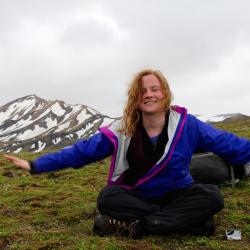Winter is kind of scary, especially on this ungodly windy, hella random rock in the middle of the ocean. And it’s even scarier when the sun all but vanishes from the heavens above. So after hearing and sharing horror stories about three-hour days, blizzards and seasonal depression, we (two interns fond of co-writing things and referring to ourselves in the third person) are all-out terrified of the coming months.
Who are we?
Allow us introduce ourselves. Becky has one terrible, awful, soul-stifling Icelandic winter under her belt. You’d think this would be good experience and all that, except sometimes when she thinks of last year’s November-March, she can only remember begging any and all deities for just, like, a minute of sunlight.
Alex is spending his first winter north of ye ole lands of Nether. He’s also nervous, maybe even more so because Becky will often sputter horror stories about Icelandic winter, completely unprompted. But he has Icelandic blood in him and a greater strength of will, so he might be fine. He’ll be fine… Probably.
In preparation for this dalliance with weather god and planetary overlord alike, we sat down with Erla Björnsdóttir, a psychologist and sleep expert, as well as the CEO of Betri svefn and vice president of the Icelandic Sleep Research Society. Since she knows a thing or two about Seasonal Affective Disorder, she helped us hammer down the facts and fallacies of SAD. During our talk with Erla, we learned many things, which we’ve summarized in the section below. All quotes are from Erla.
FAQs about SAD / the SAD truth
What is Seasonal Affective Disorder?
“It is the form of depression that gets worse when the days start to get shorter. It’s bound with the season. That’s the distinctive factor.”
What are the symptoms?
“You sleep a lot and you eat a lot. And you eat a lot of carbohydrate-heavy foods.”
Is it a clinical condition?
“Yes. You have to be pretty affected to have the clinical diagnosis of Seasonal Affective Disorder, that’s when it’s having some negative impact on your life other than just a lack of energy that many of us feel during these dark months in Iceland.”
Who should I contact if I’m feeling the affects of SAD?
“The GP is often a good start because he knows you, he knows your history. He can then refer you to experts who are working with this.”
When should I seek help?
“I think if you are at the point where you think, ‘I should seek help,’ then you should. You never go to a psychologist for too little reason. If you are there, there is a reason.”
What treatments are used to help with the symptoms of SAD?
“We know that the sunlight is the best cure for this kind of depression. So we have these artificial sunlight lamps that we can use, and sometimes that’s enough. But sometimes it’s more severe, and you need medication or some behavioral therapy to go along with it.”
What does SAD have to do with sleep?
“Many of my patients who suffer from insomnia also have SAD. I often see there’s a high peak during the dark months at my [sleep] clinic.”
The serious side
During the interview, we also discovered that larger-scale, politically debated changes could help the battle with SAD. Erla is the vice president of the Icelandic Sleep Research Society, and one of the main objectives of the society has been to change Iceland’s time zone to observe daylight savings time.
She thinks this change could come with important benefits: “If we were on the right time zone, we would have, for example, six weeks more of bright mornings. And it’s the morning brightness that really sets our internal clock… it’s most important for us to get brightness in the mornings.” Erla even linked the effects of time zone and daytime darkness with high school dropout rates, noting that she sees many smart young boys in her sleep clinic in the winter. Many young men end up dropping out of school because of trouble getting up in the morning.
Coming away from our meeting with Erla, we learned that SAD is a serious thing. It’s funny because its acronym spells the name of a common emotion, but it’s not funny because it’s something that really affects people’s lives. As you go about the darkened days, please keep a sharp mind and a sharp eye out for the symptoms of SAD. Though our advice may seem silly at times, we are taking this disorder seriously. And we admire all comrades out there doing the same.
Stay tuned for our future accounts of winter struggles. We’ll be keeping track of the winter blues and giving you everything you need to make it through this semi-endless night.
Buy subscriptions, t-shirts and more from our shop right here!



















